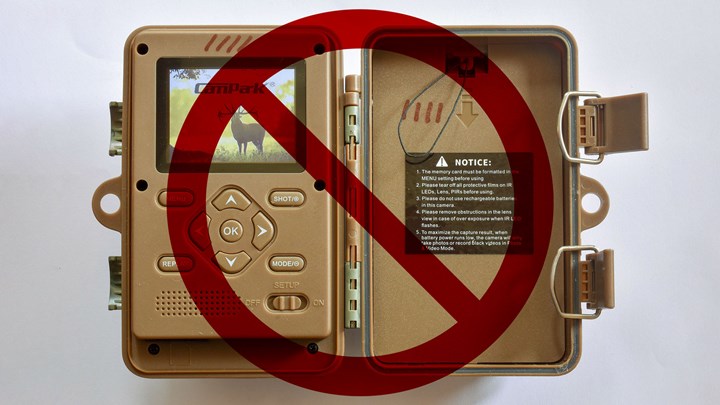
by Mark Chesnut - Monday, April 10, 2023

The war against advanced technology used in sport hunting continues, with Kansas recently joining a number of other states in banning trail cameras for hunting use. The Kansas Department of Wildlife and Parks Commission voted on March 9 to ban the use of the devices on all public lands in the Sunflower State year-round.
The new regulation reads: “No person shall place, maintain, or use a trail or game camera on department lands, or any images or video from a trail or game camera including location, time, or date, for any purpose on department lands and waters including walk-in hunting areas (WIHA) and integrated WIHAs.
“For the purpose of this regulation, ‘trail or game camera’ shall include any remote motion-activated or infrared camera in which the shutter is activated by sound triggers, proximity sensation, radio transmitters, or a self-timer built into the trail or game camera.”
In arguing for the ban, Commissioner Gerald Lauber pointed more toward privacy aspects, rather than the idea that such cameras violate the rules of “fair chase.”
“There are some deleterious issues when it comes to trail cameras,” added Lauber. “In some places, cameras are used to spy on other hunters. And some people recoil from having a camera. They’re private. They don’t want to have somebody take their picture and then have it on Facebook.”
However, the argument against trail cameras always boils down to the matter of “fair chase,” and the inference that using a trail camera somehow violates that is a slap in the face to the millions of ethical hunters throughout the country who use such cameras and enjoy setting them out and reviewing the photos and video footage they capture. It is equally offensive to those companies who manufacture and market such cameras—and who pay a hefty excise tax that is earmarked for wildlife conservation.
Unlike some far western states, Kansas doesn’t have a lot of public lands, with only about 3 percent of the state under public ownership. However, the ban also applies to private lands enrolled under the state’s WIHA Program, which is administered by Kansas Wildlife and Parks and is popular for hunting several game species.
As we reported in June 2021, the Arizona Game and Fish Department Commission voted unanimously to ban trail cameras beginning in 2022 “for the purpose of taking or aiding in the take of wildlife or locating wildlife for the purpose of taking or aiding in the take of wildlife.” Then early last year, the Utah Wildlife Board, which makes rule-change recommendations to the state’s Division of Wildlife Resources, voted to ban the use of trail cameras and some other electronics in hunting through most of the big game hunting season.
Note that Kansas, Utah and Arizona aren’t the only states to ban the use of such devices for hunting purposes. In 2018, Nevada instituted a law stating that a person shall not place, maintain or use a trail camera or similar device on public land, or private land without permission from the landowner, from Aug. 1 to Dec. 31 of each year. If the camera has the capability of transmitting the images or video, it shall not be used from July 1 to Dec. 31. The Nevada law also prohibits the use of trail cameras at any time if the placement, maintenance or use of the trail camera or similar device prevents wildlife from accessing, or alters the manner in which wildlife accesses, a spring, water source or artificial basin that is used by wildlife and collects or is designed and constructed to collect water.
Additionally, Montana banned the use of all trail cameras in 2010, but the law was later changed to apply only to those that are linked to cell phones and that transmit pictures and videos remotely. Meanwhile, in New Hampshire, a difficult-to-enforce law prohibits hunters from taking an animal on the same day that trail-camera images of that animal are captured. And in Alaska, wildlife officials restrict the amount of information hunters are permitted to receive from trail cameras during hunting season.
Interestingly, a ban on game cameras not only affects hunters, but also is deleterious to manufacturers of such cameras and even sporting goods retailers who sell such products. So, the ruling is likely to trickle down and harm some who were not considered by the commission when making the decision.
The new law passed by Kansas wildlife commissioners did not affect trail-camera use on most private lands, where the devices are still permitted.
About the Author
Freelance writer and editor Mark Chesnut is the owner/editorial director at Red Setter Communications LLC in Jenks, Okla. An avid hunter, shooter and field-trialer, he has been covering Second Amendment issues and politics on a near-daily basis for nearly 25 years.
E-mail your comments/questions about this site to:
[email protected]
